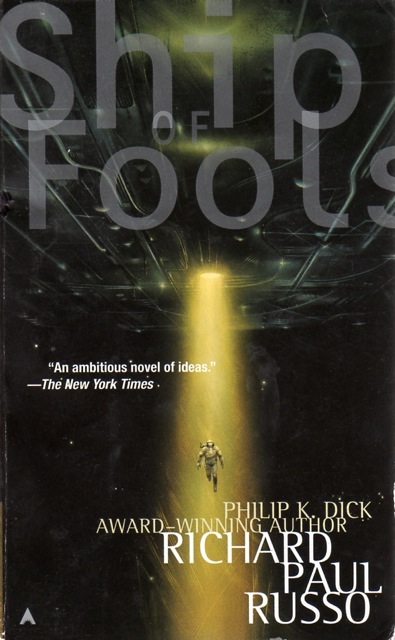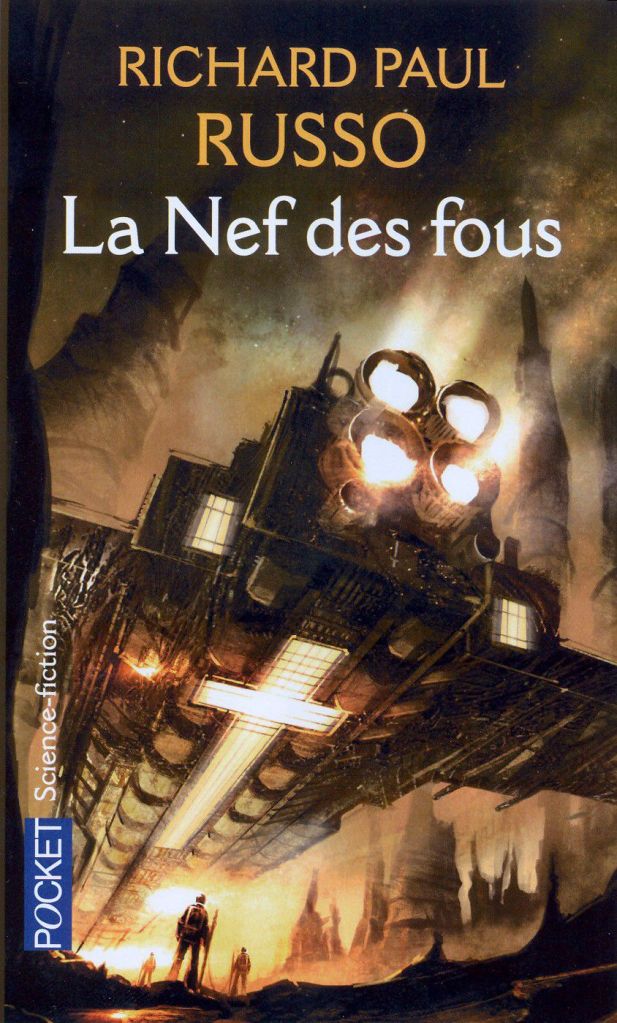I have this friend. We’ll call him Dave, because that is his name. Dave is a sci-fi nut. An entire wall of his apartment is lined with shelves stuffed with old mass-market paperbacks. I listen to what he has to say on the subject, because he’s read so much more of it than I have. So when he slapped a book in my hand one night called Ship of Fools, by Richard Paul Russo, and told me it was “phenomenal,” I took him seriously.

Russo was born in 1954. His first short story, “Firebird Suite,” appeared in Amazing Stories in 1981. His first novel, Inner Eclipse, followed in 1988. His second novel, Subterranean Gallery (1989), won the Philip K. Dick Award and was nominated for the Arthur C. Clarke Award. He is best known for a trilogy of novels centering on the character of Lt. Frank Carlucci, entitled Destroying Angel (1992), Carlucci’s Edge (1995), and Carlucci’s Heart (1997). Nick Gevers wrote in a 2000 interview that Russo’s writings “are characterized by an understated intensity and an affecting compassion; their deft painterly depictions of the extreme edges of human emotion and experience are carefully observed and crafted.” Gevers’ description applies equally well to Ship of Fools, published in 2001.
The book begins aboard a massive spaceship called the Argonos. The Argonos has been floating through space for hundreds of years, so long that its original mission has been forgotten by those aboard. Earth is no longer suitable for habitation. The novel’s protagonist is Bartolomeo Aguilera, an orphan with severe physical deformities that he compensates for with a mechanical exoskeleton. Aguilera is the closest confidant of the ship’s captain, Nikos, and is distrusted by all because of it, in particular the scheming Bishop Soldano, the current head of the Church.
One day the Argonos picks up a signal originating from a planet capable of human habitation, dubbed Antioch. Captain Nikos sends a team to investigate, but a horrifying discovery compels the Argonos to flee. However, this discovery triggers another signal, leading the Argonos to perhaps the most important find in human history: an alien starship, seemingly abandoned, floating in the depths of space. What is its connection to the terror on Antioch, and what other secrets might it conceal?

You might think from the description that Ship of Fools is your standard “haunted house in space” story, something akin to a literary Event Horizon. On its surface, it is that. A good deal of the novel concerns the exploration of the alien starship, and many characters meet violent ends within. Russo’s pacing rivals the best thriller writers; I am not a very fast reader, but I finished Ship of Fools quickly.
Beneath its thriller surface, however, Ship of Fools has huge concerns on its mind. This is a science-fiction novel about that most unscientific of topics: religion. Does God exist? Is there Evil in the universe? Do we have free will, or are our fates predetermined? These are hefty questions for any writer, and while I doubt this novel will make anyone discard their copy of the Summa Theologiae, it is impressive how thoughtfully Russo explores his subject within the context of the horror-thriller.
There is a beautiful scene where Aguilera and Father Veronica, one of the Argonos‘ priests, discuss God and free will. Aguilera is an atheist, and genuinely does not understand how anyone could find comfort in a God that seemingly ignores our pain and struggles. Father Veronica answers:
“If He had created us in such a way that we could only do good, if we were incapable of acting badly, selfishly, causing pain or harm, then the notion of free will would be meaningless, would it not? Not only that, true free will precludes God’s intervention in our lives. There is no real free will if God intercedes to protect us or save us from the consequences of our own or other people’s actions or choices. We have to face those consequences ourselves.”
In short, Father Veronica is explaining the sacrifice God has made to allow us autonomy. I am also an atheist, but I must confess that this scene left me in tears, for the first time in my life coming close to something resembling understanding of what it might mean to have faith.

I have read much criticism of the ending – that it takes too long, that it falls back on monster movie clichés, that it leaves too much unresolved. Perhaps these things are true, and yet if I were in Russo’s shoes I’m not sure I would have written it any differently. I will agree the climax drags a bit, but Russo’s writing is so brisk that in the end this hardly matters. I would also argue the ending subverts monster movie tropes by having the final confrontation between humans and aliens occur “off-screen,” as it were.
The third criticism seems more substantial, but I think it misses the point. Ship of Fools does leave much unresolved, particularly the nature of the alien starship. At the end of the book we know little more than we did at the beginning – which is to say, almost nothing. I can see how some readers might come away disappointed. However, I believe answering our questions would have undermined the novel’s themes. Is there Evil in the universe? Had Russo allowed us enough information to impose morality on the aliens, he would have answered a question that, ultimately, is unanswerable. Instead, he wisely leaves us to draw our own conclusions, and this is his approach to the other big questions of the text.

In the United Kingdom, Ship of Fools was published under the title Unto Leviathan. Regardless of title, this is one of the best science-fiction novels I have read, an exciting and frightening tale that never loses sight of its characters or its themes. I appreciated that the protagonist was differently abled – it felt fitting, with humans outcast in the depths of the space, that the novel should center on an outcast. I also appreciated the multi-cultural crew of the Argonos. It seems others felt similarly: Ship of Fools netted Russo his second Philip K. Dick Award.
In short, you should read this. It’s phenomenal.
NEXT TIME: The Rats by James Herbert!